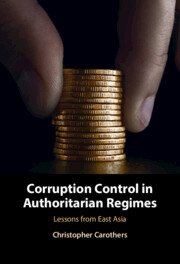‘In this provocative, well-researched and wide-ranging book, Carothers shows that autocratic efforts to control corruption are more common, occur for different reasons, and are more often successful than we think. His analysis of anti-corruption drives by different leaders in Taiwan, South Korea, and China sheds new light on the history and contemporary politics of all three places, and his identification of a distinctly authoritarian anti-corruption model is theoretically path-breaking as well as policy-relevant. This challenge to the conventional wisdom deserves to be read carefully, by scholars and policymakers alike.’
Sheena Chestnut Greitens - University of Texas at Austin
‘Carothers has written an important book challenging the conventional wisdom that there is a necessary connection between authoritarian government and political corruption. Through both a quantitative analysis and historical case studies, he shows that a number of authoritarian regimes, including Xi Jinping's China, have succeeded in reducing levels of corruption. Highly recommended for both China specialists and governance studies.’
Francis Fukuyama - Stanford University
‘Corruption Control in Authoritarian Regimes addresses the classical question of whether dictatorships can curb the predatory behavior of their agents. Carothers’ invaluable comparative study of how three dictatorships in East Asia tackled corruption provides an original and persuasive answer. This book is a major contribution to the literature on corruption in general, and on the political economy of authoritarianism in particular.’
Minxin Pei - Claremont McKenna College
‘Carothers breaks open the black box of authoritarianism to provide much needed insight into the politics of corruption. Whether one wants to learn more about political development and durability in East Asia, or when, how, and why autocrats curb corruption more generally, this book delivers.’
Karrie J. Koesel - University of Notre Dame
'It is well written, carefully documented and relies on extensive primary sources collected in China, South Korea, Taiwan, the United States and Singapore.'
Jon S.T. Quah
Source: China Quarterly
'The book deserves praise for its depth of analysis and for the broad scope of its argument.'
Martin K. Dimitrov
Source: The Developing Economies



